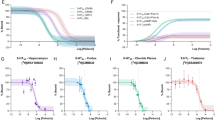Play all audios:

ABSTRACT Withdrawal from chronic use of psychostimulant drugs in humans induces a clinical syndrome characterized by fatigue, psychomotor depression, anhedonia, and disturbances of sleep.
Spontaneous locomotor activity and catalepsy were assessed in rats during withdrawal from a schedule of intravenous self-administration of high doses of amphetamine. At 2 and 4 days after
cessation of amphetamine self-administration, rats showed a state of psychomotor retardation as measured by reduction of locomotor activity and increased catalepsy. In search of a possible
pharmacologic means of intervention for such behavioral changes, the effect of repeated treatment with the nonaddictive ergot derivative lisuride during the withdrawal phase was evaluated.
At a dose devoid of any effects on locomotor activity, lisuride completely prevented the reduction in locomotor activity and the increase in catalepsy produced by amphetamine withdrawal.
These results suggest the need for further studies on lisuride as a possible novel treatment during withdrawal from psychostimulant drugs in humans. SIMILAR CONTENT BEING VIEWED BY OTHERS
REPEATED LOW DOSES OF PSILOCYBIN INCREASE RESILIENCE TO STRESS, LOWER COMPULSIVE ACTIONS, AND STRENGTHEN CORTICAL CONNECTIONS TO THE PARAVENTRICULAR THALAMIC NUCLEUS IN RATS Article 02
October 2023 DIFFERENTIAL EFFECTS OF ACUTE AND CHRONIC ANTAGONIST AND AN IRREVERSIBLE ANTAGONIST TREATMENT ON COCAINE SELF-ADMINISTRATION BEHAVIOR IN RATS Article Open access 24 May 2022
REL-1017 (ESMETHADONE; D-METHADONE) DOES NOT CAUSE REINFORCING EFFECT, PHYSICAL DEPENDENCE AND WITHDRAWAL SIGNS IN SPRAGUE DAWLEY RATS Article Open access 06 July 2022 ARTICLE PDF AUTHOR
INFORMATION AUTHORS AND AFFILIATIONS * From the Department of Neuropharmacology, The Scripps Research Institute, La Jolla, California Luigi Pulvirenti M.D. & George F. Koob Ph.D Authors
* Luigi Pulvirenti M.D. View author publications You can also search for this author inPubMed Google Scholar * George F. Koob Ph.D View author publications You can also search for this
author inPubMed Google Scholar ADDITIONAL INFORMATION Address reprint requests to: Luigi Pulvirenti, M.D., Biochemical Psychopharmacology Unit, "C. Mondino" Foundation, Department
of Neurology, University of Pavia, Via Palestro 3, Pavia, 27100, ITALY. RIGHTS AND PERMISSIONS Reprints and permissions ABOUT THIS ARTICLE CITE THIS ARTICLE Pulvirenti, L., Koob, G. Lisuride
Reduces Psychomotor Retardation during Withdrawal from Chronic Intravenous Amphetamine Self-Administration in Rats. _Neuropsychopharmacol_ 8, 213–218 (1993).
https://doi.org/10.1038/npp.1993.23 Download citation * Received: 02 August 1991 * Revised: 09 July 1992 * Accepted: 15 July 1992 * Issue Date: 01 May 1993 * DOI:
https://doi.org/10.1038/npp.1993.23 SHARE THIS ARTICLE Anyone you share the following link with will be able to read this content: Get shareable link Sorry, a shareable link is not currently
available for this article. Copy to clipboard Provided by the Springer Nature SharedIt content-sharing initiative KEYWORDS * Amphetamine * Drug self-administration * Dopamine * Animal
models of depression * Lisuride * Psychostimulant withdrawal
